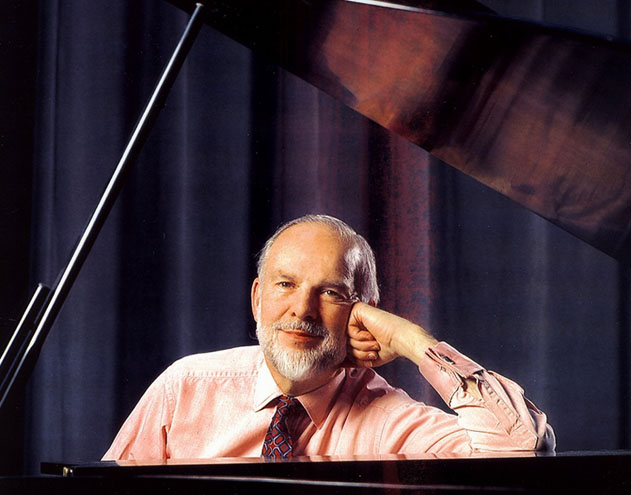Legendary Composer William Perry - Creating the Score, Silent to Sound
William Perry, in his famous “Stravinsky pose”
William Perry, born in Elmira, New York in 1930, has wholly embraced his destiny. Dedicated in the fullest harmonious measure, empowered by creativity and letting the aspects of it flow freely, infused with a joie de vivre and tireless enthusiasm, he has long been acknowledged as one of the most brilliant and accomplished composers and producers in the world of film music.
Home Page |
Newsletter, |
He received an Emmy for his PBS television productions,The Silent Years, first hosted by Orson Welles in 1971 and then by Lillian Gish in 1975, who also starred in one of the features, Broken Blossoms (1919). (Most of the Killiam-restored films that aired on both series were scored/piano accompanied by Perry.) He eventually became involved with more than 70 productions broadcast on PBS.
In addition, for many years Perry was music director and composer-in-residence at the Museum of Modern Art in New York (MOMA), where he wrote (and was piano accompanist to) over 200 scores for their silent film collection. He was also accompanist for silent film showings at other major film centres during the same period.
Film work aside, he wrote the music and co-wrote the lyrics for the 1985 Christmas season short-run Broadway musical, Wind in the Willows, starring Nathan Lane. With 25 previews and 4 formal performances, the play based on the 1908 children's novel by Kenneth Grahame and adapted by Jane Iredale, earned 3 Tony Award nominations.
Perry and Iredale’s dramatization of the works of Mark Twain as a musical biography, “Mark Twain: The Musical,” premiered as a stage musical in 1987 and ran until 1995 in Elmira, NY and Hartford, CT. LML Music later issued a CD of the complete original stage cast recording.
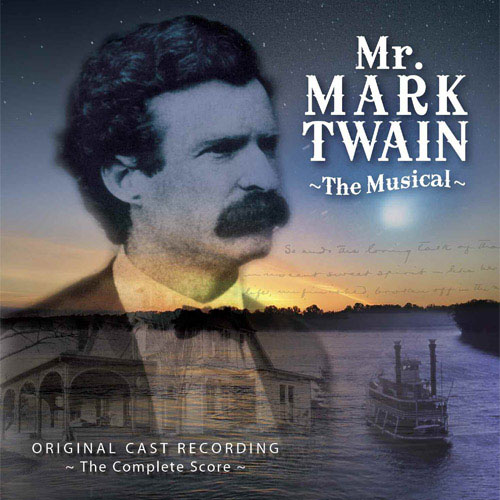
Trobriand Music, also the publisher of Perry's Jamestown Concerto CD (which is slated for future review), was the original licensor of the large scale Mark Twain stage musical known as Mark Twain ~ The Musical, and for which William Perry composed the music and lyrics. Trobriand relates that, "[It was] the life story of Mark Twain and his family, with production numbers based on various of Twain's works."
Perry relates that he is "currently working on a reduced stage version that carries the name Mr. Mark Twain."
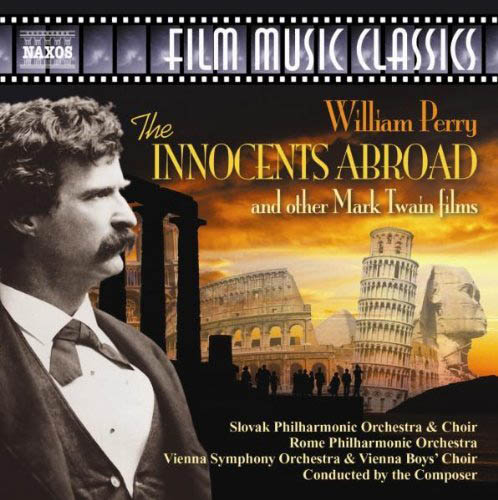
William Perry - The Innocents Abroad and Other Mark Twain Films: From the Naxos biographical liner notes about William Perry in the CD Music For Great Films of the Silent Era - Part Two: “His six definitive films on the major works of Mark Twain won the prestigious George Foster Peabody Award. The music for these films is [also] available on NAXOS.”
The 2008 CD was released as The Innocents Abroad and Other Mark Twain Films, and it will also be reviewed at some point in the near future. (The selections in the NAXOS CD were previously released by Premier Recordings as Life on the Mississippi: The Film Music of William Perry.)
Prior to Perry's production of the Twain stage musical, he produced and wrote the scores for numerous feature films inspired by Twain's major works. Six of these movies were also aired on Great Performances and American Playhouse in the 1980s; music selections from the scores would be featured on The Innocents Abroad and Other Mark Twain Films CD.
Great Performances:
Life on the Mississippi (1980)
The Private History of a Campaign That Failed (1981)
The Mysterious Stranger (1982)
The Innocents Abroad (1983)
American Playhouse:
Pudd’nhead Wilson (1984)
Adventures of Huckleberry Finn (a four hour adaptation, 1986)
As composer of the soundtracks and producer of the award-winning Twain films, Perry saw the films overall win a Peabody Award and garner five Cine Golden Eagle Awards.
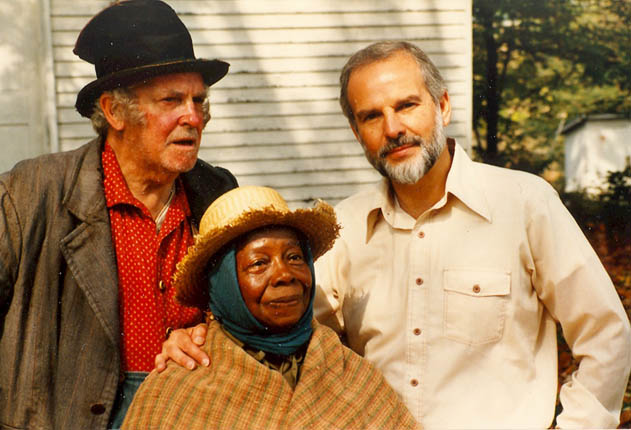
William Perry on location filming Adventures of Huckleberry Finn in Kentucky, 1985. Barnard Hughes, who played The King, poses with Butterfly McQueen in costume as the Blind Negress, and Perry.
As specialized as he is in the field of composing film scores, there are other amazing aspects to discover about Perry in the wider entertainment universe. He branched into work in silent film scoring following directorial and production work in the early years of television. He wrote script text for Lux Video Theatre, and worked with Arthur Godfrey, Ed Sullivan, Jackie Gleason and other entertainers. Perry directed the first colour commercial to be broadcast live and coast-to-coast for "The Price is Right" game show, as well as producing the first musical commercial to be broadcast on videotape on The Jackie Gleason Show.
Moving forward through his career, he soon donned the topcoats of conductor, lyricist and film score composer. Between 1976 and 1978, he also produced the national PBS poetry series "Anyone for Tennyson?" which included Henry Fonda, Jack Lemmon, William Shatner and Vincent Price among the recitalists.
From the beginning of his composing career, Perry has been a pioneering "storyteller," and he is still creating music that evokes immediate and highly compelling images. Melodic, often symbolic puzzle pieces and musical instrument metaphors snap together to twig the human spirit. His inventiveness can take the form of an unexpected whistleblow that takes you back to a time and place, or unusual instrument combos and expressively played notes and chords will give the impression that a huge freight-passenger train is rolling down the tracks - directly toward you. Other ingenious ways orchestral instruments are employed as "sound" effects convince you that his compositions emerged in an arena in which he knew he could produce music with unlimited possibilities. Perry never holds back the reins on creativity. Letting the Diva Muse out of the starting gate, it's with expectant readiness he follows where she flies through varying realms and genres of musical inspiration. He makes the music come together at times like plucking sweet, ripe plums and discovering the sparkle of gems within. Magical moments in his scores linger, creating desire to hold onto the enchantment. Listen once, listen twice, and you must listen many times more.
You can also hear the "history" of orchestral music, and reverent bows to composers, in his scores. His eminent compositions are not a gleaning, but rather a transformation, a step-up of careful fathoming within an encompassing circle, in which all that a person knows becomes realigned in their creative core to emerge as something extraordinary and at the same time possessing a sense of appealing familiarity.
His approach is straightforward, yet unpredictably exciting. He invests the living pulse of his music with shadow and light diversity and exacting moments of truth that perfectly fit the soul of the visual and pleases the listener's ear. While weaving scores and songs on his inner creative loom, Perry utilizes evolved skills and creative devices, dallies with elements of surprise, layering and mixing orchestral sounds within compositions, capturing that which is unique in scope and imagination in terms of how orchestra instruments can concert differently and anew with each other. The output is always accomplished in a stylish package for inviting listening with innovative touches throughout. Its appeal is also ultimately irresistibly refreshing. It's no surprise that he has been awarded over 12 ASCAP Awards for his compositions.
Many prestigious historical and contemporary composers of note are extremely gifted - and exceptionally prolific. Such is the case of William Perry and his artful, timeless film scores. Artistes and their palettes in legion have had similar experiences. Put the hand to the piano, the pen to paper, the brush to canvas, and what emerges will often come from unknown places within the creator and/or in combination with external influences and experiences.
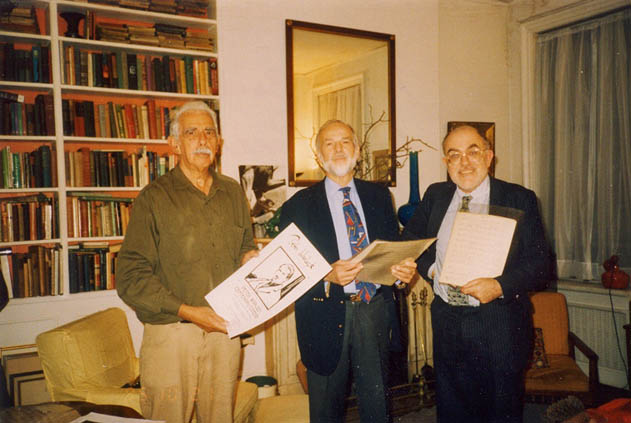
William Perry (centre) with two leading scholars of the Peter Warlock Society, Robert Beckhard and Malcolm Rudland. Says Perry, “The Society is located in England, and I have been for many years the President of the North American Chapter. Warlock, whose real name was Philip Heseltine, was a minor but celebrated English composer (1894-1930), and influences from his music sometimes turn up in my work.”
And how does he "paint" a panoramic sky of musical impressions within a silent canvas horizon? Perry successfully reaches back in time into the silent film world to muster, ponder and incorporate sensations of then relevant music while living and producing in our own modern time frame. The composer, the writer, the artist in that situation, will have an affinity for, an instinct, and an abundant accumulation of knowledge already which evolves as necessary into authentic experience, and a complete understanding in a veritably true vintage sense of frame of reference. And then, voila, no detectable dividing line will separate past from present in a finished, contemporary work. This is what I hear in the sensitive, intricate compositions of William Perry. These are not formula-wrought audio throwbacks to yesteryear. Nor are they pseudo songs that have the reputation of a Victor Herbert operetta updated and altered significantly to serve a film studio decades later. His compositions have the genuine ring of "then" now, written specifically for a period, not just adapted loosely to it. We purposely saturate ourselves with things of the past to absorb history, go on to make history, and ultimately become history's future. We have always recognized and honoured those gifted this way in the past; this is what also justifies us, and enables us, to refer to someone today as "a little Mozart" or the "new Chopin."
William Perry has undeniably made lasting and important contributions to film score composing, along the way rekindling interest in great films from the silent era. He himself had been inspired by earlier film and classical music composers. Today's dedicated talents, like silent film composers and piano accompanists Donald Sosin and Ben Model, are following in Perry's footsteps in some ways and doing outstanding trailblazing of their own. Such highly creative individuals and groups are making equally inspired achievements and ensuring that silent film, obscure and more well known titles, will continue to be restored physically often from many different sources, and musically drawing from original as well as writing new faithful-in-period scores.
Perry, who was featured in the earlier Naxos 2009 CD release Romance of the Silver Screen, was himself in the good company of esteemed film score composers from various eras on the CD. To name a few – Bernard Herrmann, Erich Wolfgang Korngold, Nino Rota, Miklos Rozsa, Dmitry Shostakovich, Max Steiner, and Victor Young.
Moreover, William Perry himself is still a prodigious force, a "harmonious blacksmith" continuing to forge upon a primed canvas, a master awaiting his next brushwork of musical art to emerge into final form. It has been his lifelong habit to brim with ideas and then to faithfully apply his melodic imagination and gifts. His sheer catalogue of works of composing for film, TV and the musical stage is immense, and formidably impressive. His knowledge of, and instinctive feel for, "music for great films of the silent era" will likely always be the keynotes to understanding how his music speaks for the silent image up on the screen.
He is one of those talents who has shared his best experiences with us on stage, television, film and recordings, who continues to communicate beauty and art through his expressive compositions and other productions. With a number of marvellous projects currently in the planning stages, William Perry still has his pen to the score. The Diva Muse, that eternal soul of music, sits upon his shoulder with gossamer wings flitting in expectation. The process of creating and pulling from the air that exceptional "sound out of silence" that gives clear voice to "the sound of silents" is what he has been doing since the beginning - always with pure creativity and unbound artfulness, holding on tight to what would otherwise be elusive. In heart and in spirit over the years, composer Perry has devotedly crafted his distinct musical visions, all the while remaining down to earth and true to himself and his music. His shining journey continues, strolling along with the alluring influences of magical Provence in its enduring heyday of art and culture, and with the resplendent sunbeams of a Mark Twain afternoon keeping it all as simple as a white picket fence.
